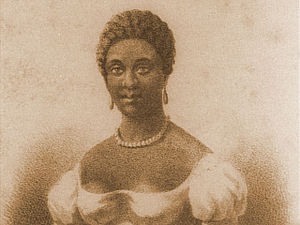THIS LADY:
Hem hem. We're going to have to break this down oppa AP English style.
'Twas not mercy who brought her from her pagan land. It was a genocide called the slave trade that resulted in the deaths of 17 million Blacks (and don't you dare ask me for a footnote). 'Twas capitalist greed, my friend. No one taught her to worship God, and it wasn't a blessing that colonists preached Christianity to individuals of color so as to pacify them and instruct them to wait for justice in the "next life" (according to Malcolm X in his autobiography-biography-thing). Then she claims that the saving grace of Blackness is that Blacks have the capability to assimilate.
This is very upsetting to me, but I should have guessed. "Critically acclaimed" is code for White-approved, and if Wheatley was popular with White during that time, it's no wonder her writings reflected such internalized racism. Her framing of slavery as merciful and Blackness as curable are clear reflections of the Sambo rhetoric White wanted to hear at that time.
Sad, sad, sad. And disappointing. There's a part of me that wants to see her as the Tyler Perry of the 1700's. But she wasn't, because she paved the way for me, nonetheless. So I'm still grateful. Grateful and sad.
What do y'all think of role models and way-pavers that are imperfect in their social-justice-y ways?
THIS LADY IS EPIC FOR SO MANY REASONS. Her name
is Phillis Wheatley, 1753-84, and she was one of the first critically acclaimed
Black poets in U.S. history. Since I'm a Black girl who has always liked to
write, my mom used to tell me about Phillis Wheatley and how she was this
fantastic Black writer under horrible circumstances. She gave me hope in my
childhood that I could be the president/scientist/best-selling author! Now I'm
feelin' betrayed. Check out this poem:
On Being Brought from Africa to America, by Phillis Wheatley"'Twas mercy brought me from my Pagan land,Taught my benighted soul to understandThat there's a God, that there's a Saviour too:Once I redemption neither sought nor knew.Some view our sable race with scornful eye,"Their colour is a diabolic die."Remember, Christians, Negro's, black as Cain,May be refin'd, and join th' angelic train."
Hem hem. We're going to have to break this down oppa AP English style.
'Twas not mercy who brought her from her pagan land. It was a genocide called the slave trade that resulted in the deaths of 17 million Blacks (and don't you dare ask me for a footnote). 'Twas capitalist greed, my friend. No one taught her to worship God, and it wasn't a blessing that colonists preached Christianity to individuals of color so as to pacify them and instruct them to wait for justice in the "next life" (according to Malcolm X in his autobiography-biography-thing). Then she claims that the saving grace of Blackness is that Blacks have the capability to assimilate.
This is very upsetting to me, but I should have guessed. "Critically acclaimed" is code for White-approved, and if Wheatley was popular with White during that time, it's no wonder her writings reflected such internalized racism. Her framing of slavery as merciful and Blackness as curable are clear reflections of the Sambo rhetoric White wanted to hear at that time.
Sad, sad, sad. And disappointing. There's a part of me that wants to see her as the Tyler Perry of the 1700's. But she wasn't, because she paved the way for me, nonetheless. So I'm still grateful. Grateful and sad.
What do y'all think of role models and way-pavers that are imperfect in their social-justice-y ways?


No comments:
Post a Comment
Thoughts? Criticisms?